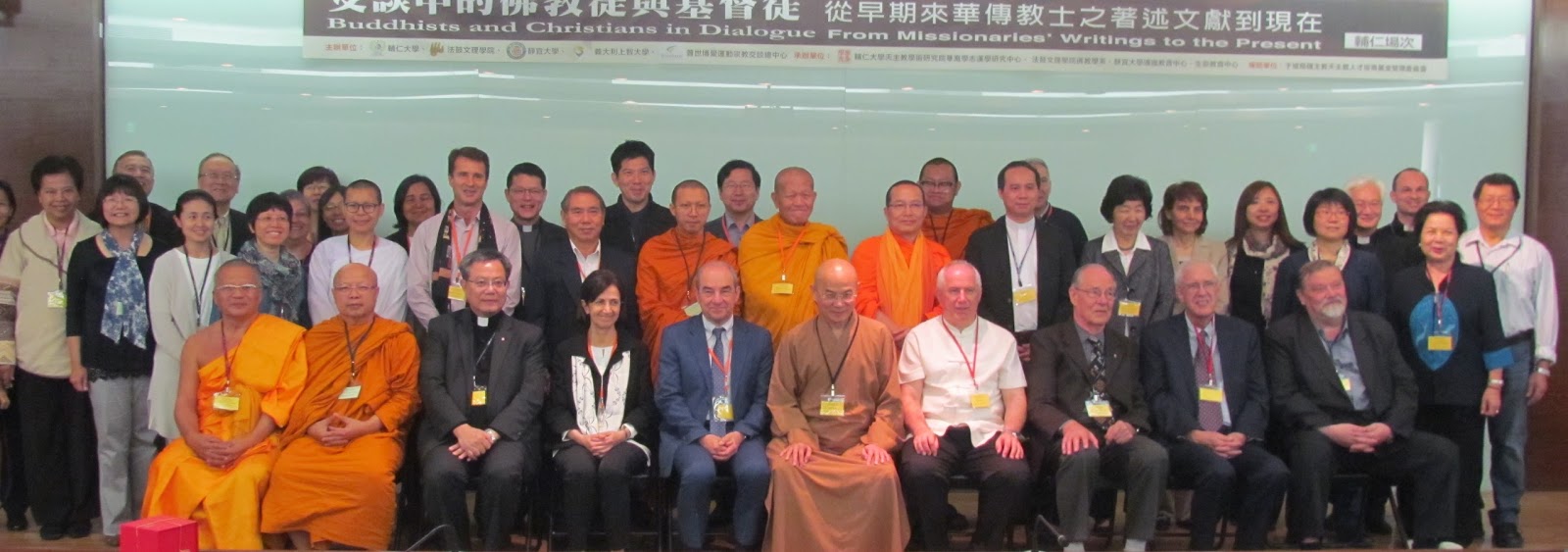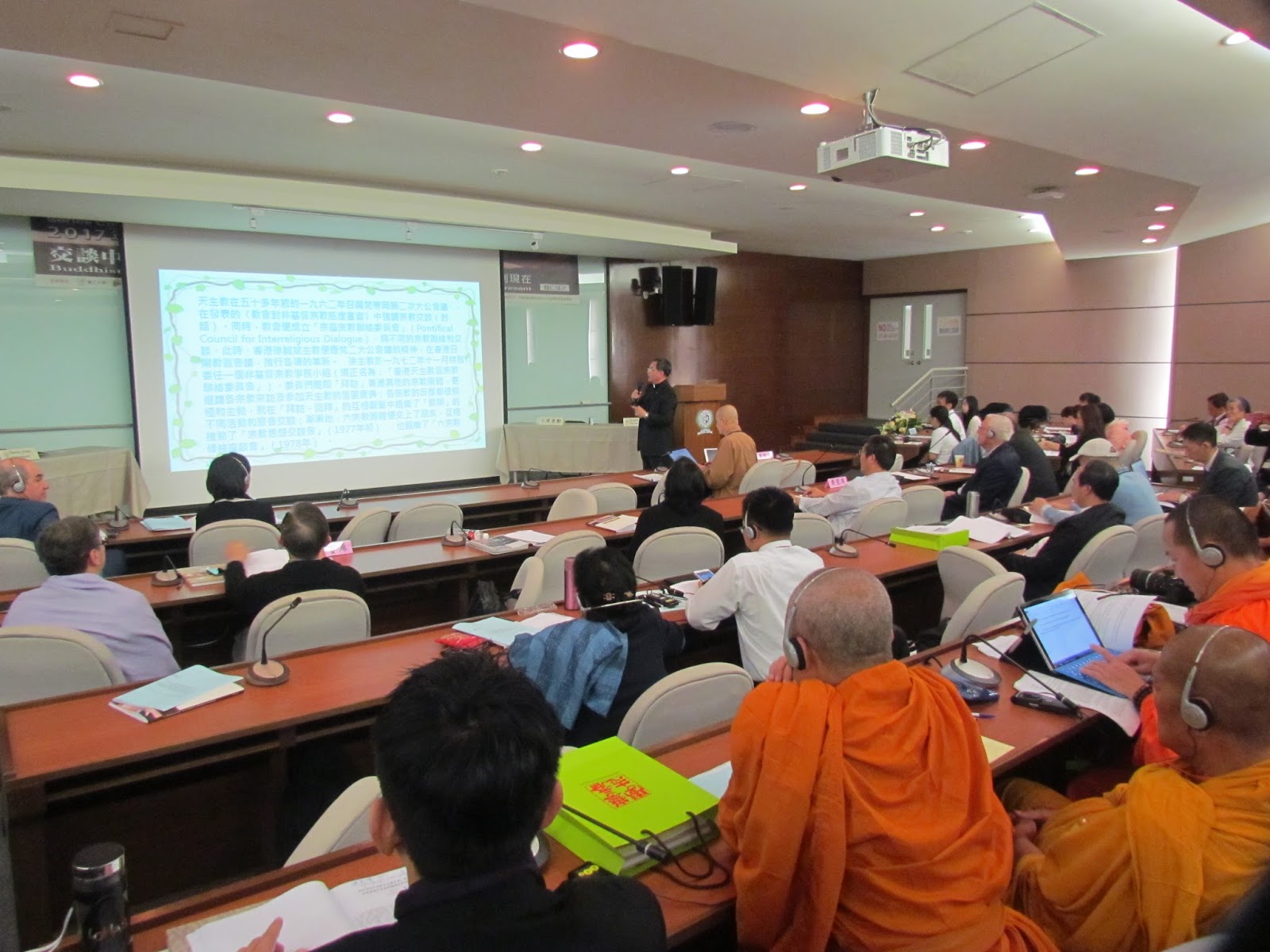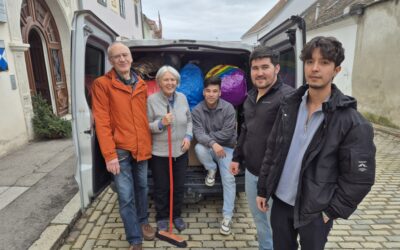 The event featured a new format punctuated by three distinct elements, the venue and religious context of a pilgrimage of dialogue, a common journey, which is an image dear to the Pope Francis who often invites us to walk together across the vast landscape of interreligious dialogue. Part one of the event was held at Fu Jen University, which is the most prestigious Catholic university on the island. The title of the event was inviting: Buddhists and Christians in Dialogue: from the writings of the missionaries to interreligious dialogue. It provoked reflection on how much has changed in the world of the religions from when the first missionaries arrived in the East at the start of the fifteenth century until today when we are working on one of the fundamental needs of humankind: dialogue between people who believe, whatever their faith may be.
The event featured a new format punctuated by three distinct elements, the venue and religious context of a pilgrimage of dialogue, a common journey, which is an image dear to the Pope Francis who often invites us to walk together across the vast landscape of interreligious dialogue. Part one of the event was held at Fu Jen University, which is the most prestigious Catholic university on the island. The title of the event was inviting: Buddhists and Christians in Dialogue: from the writings of the missionaries to interreligious dialogue. It provoked reflection on how much has changed in the world of the religions from when the first missionaries arrived in the East at the start of the fifteenth century until today when we are working on one of the fundamental needs of humankind: dialogue between people who believe, whatever their faith may be.  The day of reflection was co-organized by the Catholic University of Taiwan, by Sophia University Institute and the Focolare Centre for Interreligious Dialogue, and by Dharma Drum Mountain Buddhist Monastery and University, one of the renewal centres of Chan Buddhism of China. Seventy of the attendees were experts in the field: a large number of Theravada monks, Buddhist and Catholic lay people from Thailand, a group from Taiwan, the president of the Dharma Drum Institute for Liberal Arts, along with people from the academic world. The topics raised much interest. The presentations that regarded the writings of the missionaries were from between the fourteenth and nineteenth centuries. But the nerve centre of the reflection was Matteo Ricci, the great Jesuit apostle of Christianity in this part of the world, a master of that art of adapting that allowed him to reach the soul of the Chinese people. Yet, precisely Ricci was the centre of interest for his anything but accommodating position towards Buddhism, which he and many of his contemporaries saw as a hodgepodge of rites and pagan manifestations. The missionaries from the fifteenth to twentieth century were anything but open to the followers of Buddha and, in their debates, were set on showing who the followers of the true God and true religion were. The workshops also examined the critical position of the followers of Buddha towards Christians. It came into evidence how such sentiments were quite mutual. This historic context, for which we Christians cannot deny the need for an adequate examination of conscience for the errors committed and discriminatory actions, highlighted the positive value of the experience of the past sixty years. Today, dialogue is soaring with relationships of mutual trust and esteem, even though there are still points that always need to be kept clear and eventually defend against in order to preserve precise identity and avoid syncretism. Over the course of the workshop sessions concrete experiences of dialogue were shared from Hong Kong, Korea, Thailand, Philippines – and new actors were proposed, such as ecclesial movements and protagonists that are recognized pioneers of an experience of dialogue that then followed the tracks they had set. The example of spiritual friendship between Chiara Lubich and Nikkyo Niwano, the respective founders of the Focolare Movement and of the Rissho Kosei Kai, demonstrated how renewal movements that have become part of several religions for a century now, have become vehicles of encounter and friendship among people from different cultures and communities. These two sentiments marked the work of the first day of the symposium/pilgrimage in a serene examination of the journey accomplished over the centuries, opening to the hope for a future of reciprocal sharing and collaboration regarding the great challenges of the human race: social justice, the environment and peace. (To be continued) By Roberto Catalano
The day of reflection was co-organized by the Catholic University of Taiwan, by Sophia University Institute and the Focolare Centre for Interreligious Dialogue, and by Dharma Drum Mountain Buddhist Monastery and University, one of the renewal centres of Chan Buddhism of China. Seventy of the attendees were experts in the field: a large number of Theravada monks, Buddhist and Catholic lay people from Thailand, a group from Taiwan, the president of the Dharma Drum Institute for Liberal Arts, along with people from the academic world. The topics raised much interest. The presentations that regarded the writings of the missionaries were from between the fourteenth and nineteenth centuries. But the nerve centre of the reflection was Matteo Ricci, the great Jesuit apostle of Christianity in this part of the world, a master of that art of adapting that allowed him to reach the soul of the Chinese people. Yet, precisely Ricci was the centre of interest for his anything but accommodating position towards Buddhism, which he and many of his contemporaries saw as a hodgepodge of rites and pagan manifestations. The missionaries from the fifteenth to twentieth century were anything but open to the followers of Buddha and, in their debates, were set on showing who the followers of the true God and true religion were. The workshops also examined the critical position of the followers of Buddha towards Christians. It came into evidence how such sentiments were quite mutual. This historic context, for which we Christians cannot deny the need for an adequate examination of conscience for the errors committed and discriminatory actions, highlighted the positive value of the experience of the past sixty years. Today, dialogue is soaring with relationships of mutual trust and esteem, even though there are still points that always need to be kept clear and eventually defend against in order to preserve precise identity and avoid syncretism. Over the course of the workshop sessions concrete experiences of dialogue were shared from Hong Kong, Korea, Thailand, Philippines – and new actors were proposed, such as ecclesial movements and protagonists that are recognized pioneers of an experience of dialogue that then followed the tracks they had set. The example of spiritual friendship between Chiara Lubich and Nikkyo Niwano, the respective founders of the Focolare Movement and of the Rissho Kosei Kai, demonstrated how renewal movements that have become part of several religions for a century now, have become vehicles of encounter and friendship among people from different cultures and communities. These two sentiments marked the work of the first day of the symposium/pilgrimage in a serene examination of the journey accomplished over the centuries, opening to the hope for a future of reciprocal sharing and collaboration regarding the great challenges of the human race: social justice, the environment and peace. (To be continued) By Roberto Catalano
Want the good of others
Want the good of others




0 Comments